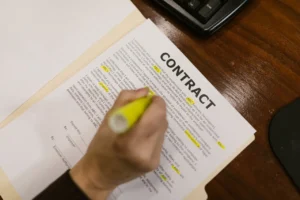Many of our clients mix up the roles of an executor and a power of attorney (POA). While both involve making decisions, they serve different purposes.
A POA manages a person’s affairs while they’re still alive. An executor steps in only after they pass away.
But that’s just the surface — there are many other differences between them. In this guide, we’ll break it all down in a simple, clear way so you can understand each role and choose the right one for your needs.

What Is an Executor of a Will?
An executor of a will is the person in charge of handling someone’s estate after they pass away. Their job is to follow the instructions left in the will and make sure everything is done legally and fairly.
The responsibilities of an executor include:
- Filing the will with the court. This starts the probate process.
- Identifying and securing everything owned by the deceased person (like money, property, and valuables).
- Paying off any outstanding bills, loans, and taxes before distributing the estate.
- Distribute assets amongst the beneficiaries named in the will.
- Working with attorneys to resolve any legal issues that may arise.
What Is a Power of Attorney?

A Power of Attorney is a legal document that lets someone else make decisions for you. The person giving the power is called the “principal”, while the recipient of the power is called an “agent” or “attorney-in-fact”.
This document is useful when someone is sick, out of the country, or unable to make decisions on their own.
There are five different types of POA:
- General POA — Gives broad powers over finances, real estate, and legal matters.
- Durable POA — Stays in effect even if the principal becomes unable to make decisions.
- Springing POA — Becomes active only under specific conditions, such as when the principal is declared mentally unfit by a doctor.
- Medical POA — Allows an agent to make healthcare decisions. For example, if the principal is unconscious, their agent may choose between surgery and other treatments.
- Special POA — Grants limited authority for specific tasks, such as selling a house.
We often explain to our clients that a POA is only valid while the principal is alive. After death, only an executor can manage their estate. A POA can also end if the principal cancels it or if there’s a set expiration date to the agreement.
Executor of Will vs Power of Attorney — 5 Differences to Know

Here are five differences between an executor of will and a POA that you should understand:
-
When Their Authority Starts and Ends
A POA is valid only while the person (principal) is alive. The agent makes decisions for them when they cannot.
In contrast, an executor steps in only after the person has passed away.
-
What They Control
A POA can cover financial, medical, or legal decisions. Depending on the type of POA, the agent may pay bills, sign contracts, or make healthcare choices.
An executor, however, only manages assets, debts, and distributions. They follow the will to divide property and settle financial matters.
-
Who They Work For
A POA agent works in the principal’s best interest. They must follow the principal’s wishes and act responsibly.
An executor works for the estate and the heirs, ensuring that everything is handled fairly and according to the will.
-
Court Involvement
A POA usually does not require court approval. It’s a private arrangement granting an agent the authority to act.
An executor, however, must go through probate — a court process that validates the will and oversees the estate’s settlement.
-
How They Are Appointed
A POA is chosen by the principal and granted legal authority through a signed document.
An executor is named in a will and is officially appointed by a court after the person’s death.
Can the Same Person Be an Executor of a Will and Power of Attorney?

Yes, the same person can be both an executor of a will and a power of attorney. But the two roles do not overlap — they have different responsibilities at different times.
If you pick the same person for both roles, make sure they are:
- Trustworthy — They will have control over your finances and estate.
- Organized — They will manage money, legal paperwork, and assets. This requires attention to detail.
- Responsible — They must act in your best interest while alive and follow your will after death.
Although choosing the same person can simplify things, it comes with a few risks. If they misuse their POA powers, they might make decisions that benefit them rather than you. That’s why it’s important to pick someone ethical and ensure there’s legal oversight.
How to Choose the Right Executor of a Will or Power of Attorney

Choosing an executor of a will or a POA is a major decision. A bad choice leads to delays, conflicts, or even financial loss. Here’s a quick guide to help you make a good decision:
-
Understand the Role You’re Assigning
Before choosing someone, decide which role you need to fill.
Whether you’re selecting the same person for both roles or different individuals, it’s important to know the differences.
To reiterate, an executor handles probate, pays debts, and distributes assets according to your will. A POA agent manages financial, medical, or legal affairs while you’re alive (but unable to handle them yourself).
-
Look for These Qualities
The best person for these roles should be trustworthy, organized, and responsible. We also recommend looking for the following qualities:
- Calm under pressure. Disputes can arise. Your executor or POA agent should handle conflicts without making emotional or biased decisions.
- Willing to serve. In the case of a POA, friends and family are often nominated against their will. The truth is not everyone wants this responsibility, so it’s best to ask them first.
- Financially smart. Your executor or POA will need to make complex financial choices, so financial knowledge is a plus.
-
Consider a Backup Choice
Life is unpredictable. If your first choice becomes unavailable, a backup prevents legal complications. Include an alternate executor and secondary POA in your documents.
-
Avoid These Common Mistakes
- Picking someone just because they’re family. Relatives aren’t always the best choice. Choose based on skills and experience — preferably a professional.
- Choosing someone too old or busy. Your executor or POA agent should be able to handle the job when the time comes.
- Not updating your choice. If relationships change, update your will or POA to reflect your current wishes.
Legal Process and Documentation for Executors and POAs
Once you’ve chosen the type of representation you need, here are the legal processes and documents needed for each role.
Legal Process for an Executor of a Will
Step 1: File the Will With the Probate Court
The executor submits the will to the probate court in the deceased’s state. If there is no will, the court appoints an administrator to handle the estate.
Step 2: Obtain Legal Authority
The court issues a Letters of Testamentary, giving the executor the power to manage the real estate. This legal document allows the executor to access bank accounts, pay debts, and distribute assets.
Step 3: Notify Creditors and Beneficiaries
The executor informs banks, government agencies, and creditors about the principal’s death. They also contact beneficiaries named in the will.
Step 4: Settle Debts and Taxes
The executor identifies and pays outstanding bills, files the deceased’s final tax return, and handles estate taxes if required.
Step 5: Distribute Assets to Heirs
Once debts are paid, the remaining assets are distributed as per the will. A final report is submitted to the court for approval.
Documents Needed for Executors
- Death certificate
- Will
- Letter of Testamentary
- Asset and debt records
Legal Process for Power of Attorney
Step 1: Draft and Sign a POA Document
You’ll sign a legally valid POA document. This document should specify the type of POA, range of responsibilities, conditions of validity, backup POA agent (if any), and expiration date.
Step 2: Get It Notarized
Most states require a notary public to witness the signing. Some states may require additional witnesses.
Step 3: File With Banks and Institutions
The POA agent provides copies to banks, insurance companies, and healthcare providers. Some institutions may require their own forms to be signed.
Step 4: Use Authority as Needed
This is not a step but an important point to consider. A POA agent can act only within the powers given in the document. Also, a POA ends when you die or revoke it.
Documents Needed for POAs
- Power of attorney document
- Proof of identity
- Financial or medical records of the principal
Common Misconceptions About Executors and Power of Attorney
We’ve seen misconceptions about executors and power of attorney lead to costly mistakes. Here are some of the most common myths we’ve seen clients come up with:
An Executor and a POA Are the Same Thing
The most common misconception we see is that a POA and an executor of will are the same. As mentioned earlier, a POA loses all power once the principal dies. The executor gains power at that point.
A Will Always Has to Go Through Probate
Not all wills require probate. Exceptions to the probate process include:
- Small estates. Some states, including North Carolina, allow estates below a certain value to bypass probate with a simplified process.
- Joint ownership. Assets like jointly owned bank accounts or property with right of survivorship transfer directly to the surviving owner without probate.
- Beneficiary designations. Life insurance, retirement accounts, and payable-on-death accounts go directly to the named beneficiary, skipping probate.
- Trusts. Assets placed in a trust don’t go through probate. Instead, they are managed and distributed by the trustee according to the trust’s terms.
POAs Generated Online Are as Effective as Those Created by Legal Professionals
Not all online POAs meet state laws or cover specific legal needs. A poorly drafted power of attorney is rejected by banks or misused.
Legal professionals, such as our team at Birch Grove Legal, ensure your POA is properly structured and drafted to protect your interests.
Executors Cannot Be Beneficiaries of the Deceased’s Will
An executor can be a beneficiary of the will. In fact, it’s quite common. Many people name their spouse, child, or another close relative as both executor and beneficiary because they trust them to carry out their final wishes.
Executors Can Do Whatever They Want
Executors have a legal duty to follow the will and act in the best interest of the beneficiaries. If an executor mismanages assets, they can be held accountable in court.
Anyone Can Be an Executor or POA
Some states have restrictions on who can serve in these roles. North Carolina, for example, requires executors to be at least 18 and mentally competent.
Banks and other institutions may also have their own requirements for POA agents. Consulting an estate planning attorney will help you understand relevant rules and avoid potential litigation if disputes arise.
When to Consult an Estate Planning Attorney?

Knowing when to consult an estate planning attorney saves you time, money, and stress. The key times to seek legal advice are as follows:
- You own property or significant assets. An attorney helps you minimize taxes and avoid probate.
- You have dependents. A properly drafted will protects your children and ensures they have a legal guardian if needed.
- You’re sick. A legally sound POA ensures someone you trust can handle finances or make medical decisions if you’re unable to do so.
- You’re updating an existing estate plan. Major life events like marriage, divorce, or new children require estate planning updates.
A timely and properly drafted will and POA can also help avoid family disputes.
If you require further information about the differences between an executor of a will vs. a power of attorney, feel free to reach out to us.
Remember, mistakes in DIY estate planning lead to invalid documents, financial loss, or legal battles — we’ve seen it all.
At Birch Grove Legal, we provide personalized estate planning solutions to protect your assets, family, and legacy.
Don’t leave your future to chance — schedule a consultation with us today to ensure your financial, legal, and health choices are honored.





0 Comments